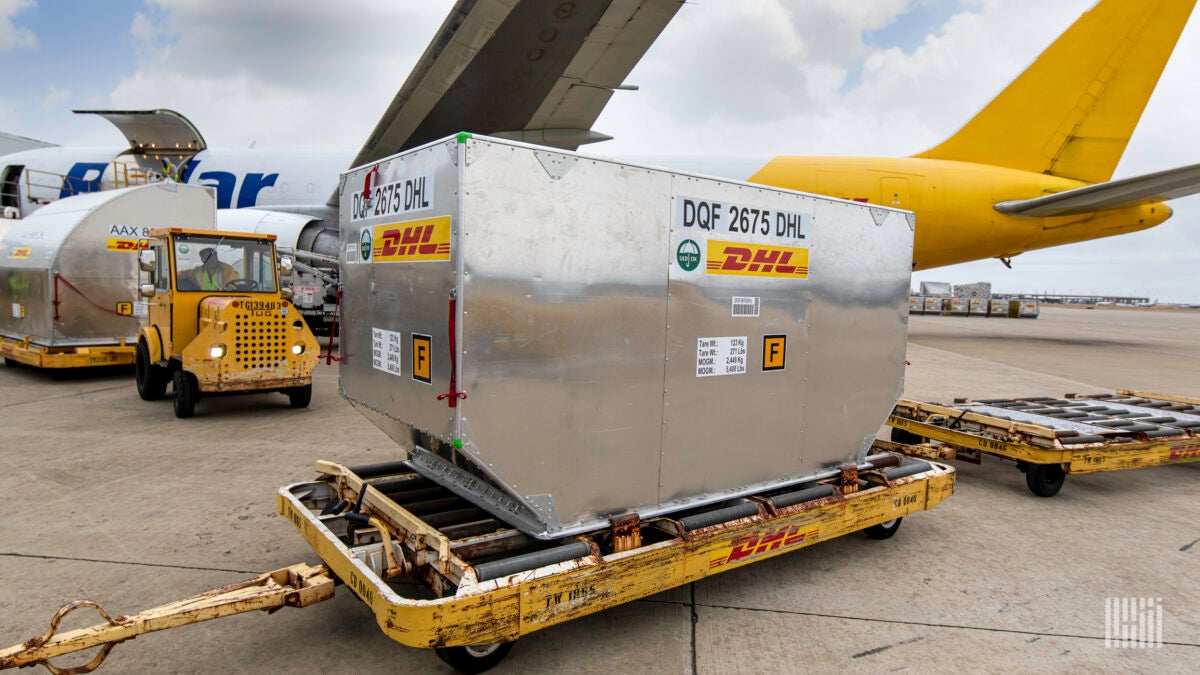Borderlands is a weekly rundown of developments in the world of United States-Mexico cross-border trucking and trade. This week: Surging cross-border flows a boon for operators like DHL; Cargo rail theft up 99% across Mexico in May; Australian clothing retailer selects Cart.com as US fulfillment partner; and Venture Solutions opens logistics warehouse in Laredo, Texas.
For DHL Global Forwarding, Mexico has become one of the hottest supply chain locations in the world.
Mexico’s rise onto the global stage has been spurred by everything from the ongoing trade conflict between the U.S. and China, logistics chains that had to pivot because of the Covid pandemic in 2020, as well as its geographic location, said Robert Reiter, CEO of DHL Global Forwarding in the U.S.
Reiter joined DHL in December, bringing 30 years of experience in logistics and transportation management to his new role. Prior to joining DHL Group, Reiter held executive positions with other prominent logistics companies in Europe and Asia.
In his new appointment, Reiter is responsible for leading more than 3,500 employees across 39 operating stations.
“Mexico is a topic that I keep hearing about, it’s a topic that comes up pretty much in every conversation with our customers,” Reiter told FreightWaves in an interview. “The regionalization, the nearshoring, the reshoring, it’s about bringing the manufacturing and sourcing footprint closer to where consumption is. As far as the U.S. is concerned, Mexico is the name of the game.”
DHL Global Forwarding is the air and ocean freight forwarding division of Deutsche Post DHL Group. The company has border facilities in Laredo, McAllen and El Paso, Texas; Nogales, Arizona; and San Diego, California. DHL also has cargo operations in Dallas and Houston.
Over the last several years, Mexico has been a beneficiary of manufacturers looking to shift supply chains closer to the U.S. Foreign direct investment (FDI) into Mexico totaled $38.2 billion from January through May, according to the country’s economy ministry.
The $38.2 billion was a 35% increase compared to the same period in 2023, when Mexico recorded FDI of $29 billion.
Reiter said when manufacturers are considering moving their operations to Mexico, the U.S., or Canada, clients often look for guidance on issues such as local regulations, customs requirements, workforce, sourcing of raw materials and logistics capabilities.
“The companies that I am talking with, generally they first look at are they in a position to source and manufacture competitively in a specific country,” Reiter said. “We have sectors like automotive, aerospace, electronics, retail, e-commerce. These sectors have found their way into Mexico.”

Reiter said companies must examine whether their manufacturing fits with the skill profile and the expertise that they find in a specific location.
“For one, companies must look at is the competence that they find in the country right for them? Other considerations are certainly infrastructure, legislation, logistics,” Reiter said. “How do I move raw material into the place? How do I move finished goods out? What does this mean in terms of taxes and tariffs for me? How does lead times change? Those are usually the conversations that we support them with. There’s a wide variety of aspects that customers look at before they decide to shift manufacturing.”
Some of Mexico’s biggest advantages as a supply chain location is its proximity to the U.S., one of the largest consumer markets in the world, Reiter said. Other advantages include trade agreements such as the United States-Canada-Mexico Agreement, known as the USMCA, which helps trade move more freely across North America.
“There are some rather attractive agreements in place between the three countries: Mexico, U.S. and Canada,” Reiter said. “If you are thinking of shifting manufacturing to Mexico, the three top points to look at are legislation, tariffs and infrastructure. If I were to start manufacturing, or shift manufacturing, those are the ones that I would look at.”
Cargo rail theft up 99% across Mexico in May
Mexican authorities recorded 307 cases of thefts from railways in May, a 99% year-over-year increase compared to the same period 2023.
The Mexican states of the states of Guanajuato reported the most incidents at 52, followed by Coahuila with 44 and Aguascalientes with 35, according to a report from T21 with statistics from Mexico’s Railway Transport Regulatory Agency (ARTF).
The most targeted commodities were industrial products (22%), construction material (15%), auto parts (14%) and grains (14%).
ARTF said cement and car tires accounted for the majority of construction material and auto parts stolen during May, respectively.
Houston-based Cart.com said omnichannel, plus-sized fashion brand City Chic picked the company to be its fulfillment partner in the U.S.
Sydney, Australia-based City Chic will leverage Cart.com’s 3PL and technology solutions and a Dallas warehouse facility to improve efficiency and customer experience for order fulfillment across the country.
“This latest partnership underscores Cart.com’s strength in serving leading global apparel brands through our modern logistics technology and warehouse facilities that can scale as they grow,” Joe Barth, Cart.com’s chief logistics officer, said in a news release.
Cart.com is a provider of unified commerce and logistics software. The company supports millions of orders per year and operates over a dozen omnichannel fulfillment centers nationwide.
Venture Solutions opens logistics warehouse in Laredo, Texas
Venture Solutions recently completed construction on a 150,000-square-foot warehouse in Laredo, Texas.
The Laredo warehouse features 30 dock doors and space for 100 trailers. The facility is Customs Trade Partnership Against Terrorism (CTPAT) certified and offers consolidation, warehousing, and vendor-managed inventory services.
“This new warehouse allows us to better serve our clients across North America,” Justin Weber, COO of Venture Solutions, said in a news release.
Rochester Hills, Michigan-based Venture Solutions specializes in supply chain optimization, consolidation and warehousing. The company serves automotive OEMs, heavy industrial customers, and consumer products.
The company also announced it is expanding its office in Saltillo, Mexico, aimed at providing customers with service across borders and within Mexico.



















